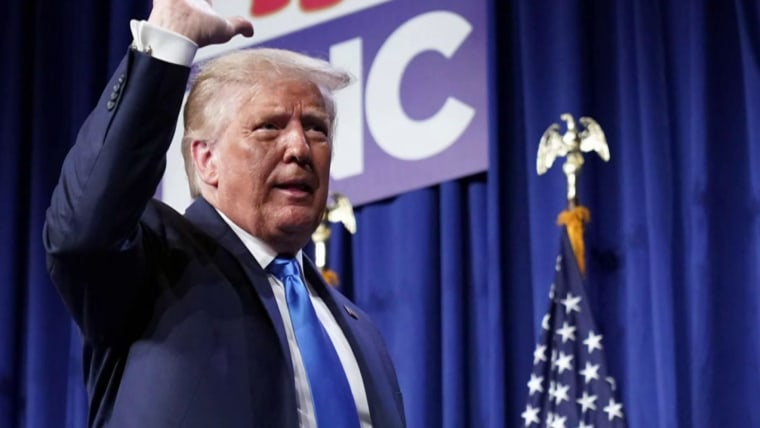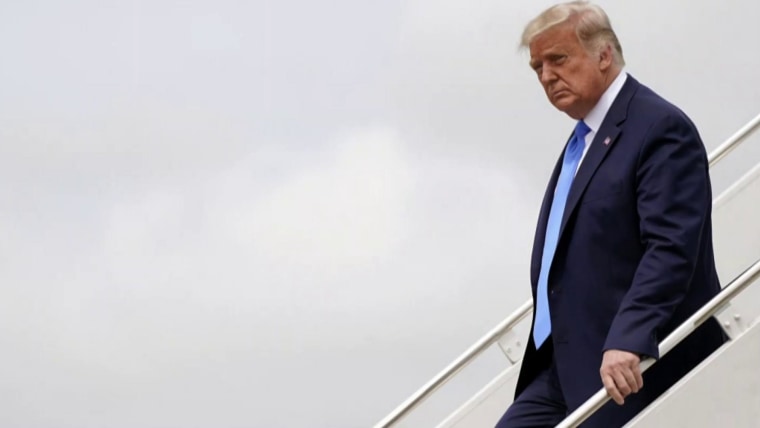WASHINGTON — President Donald Trump isn’t telling it like it is.
Instead, as he asks voters for a second term, he has turned the Republican National Convention into a fantasyland version of his presidency. In this carefully curated world, staged by federal officials in Washington and Jerusalem, Trump has defeated the coronavirus, saved the economy, built a border wall, established peace in the Middle East, recalled U.S. forces from theaters of war, and even become a champion of immigrants at a time when he is sharply curtailing their access.
The distance between reality and Trump’s presentation is both a glaring weakness for the president and a gap in which he sees strength heading into the November election.
His successes in life, from gaining fame as a real estate developer when his projects were going bankrupt to hosting a highly rated reality TV show and winning the presidency in part on promises he couldn’t keep, have taught him pretty optics can hide ugly truths effectively, particularly when people want to believe the false narrative. And yet, polls show crucial blocs of the electorate have grown tired of deceptions that cover up death tolls, economic devastation and government by chaos.
So far, the Republican National Convention has provided little reason for them to stop believing their own experience and start believing Trump’s tale.
“Hardship and heartbreak were everywhere,” Trump economic adviser Larry Kudlow said of the pandemic during Tuesday night’s session of the GOP convention. “But presidential leadership came swiftly and effectively, with an extraordinary rescue for health and safety to successfully fight the COVID virus.”
Nearly 180,000 Americans died after Trump played down the threat of the disease and accused his Democratic rivals of perpetrating a “hoax” on the public. More than 30 million Americans are out of work because federal, state and local officials eventually shut down commerce to try to contain the outbreak. But the virus continues to spread and kill, and while stocks have rallied on support from the Federal Reserve and Congress, ordinary Americans have not seen the same kind of recovery.
Trump vowed during his first campaign that he would get Mexico to pay for a wall spanning the border between the two countries. Only a small portion of the wall has been built. Trump diverted military funding to try to build more of it. Obviously, Mexico didn’t pay for it. But Trump’s former campaign CEO and others were indicted last week on charges of defrauding donors to a charity that collected money under the auspices of funding construction of the wall. One of his sons, Donald Trump Jr., is quoted in a testimonial on the group’s website.
“Peace in the Middle East. Never-ending wars were finally ended,” another of Trump’s sons, Eric Trump, said. “Promises made, and promises, for the first time, were kept.”
On the same day, Secretary of State Mike Pompeo, who would later make an unorthodox speech by a U.S. diplomat to a party convention from foreign soil, pressed Arab-majority countries to make peace with Israel. That’s a clear indication that the Trump administration realizes peace remains elusive in the region. Moreover, thousands of American troops are still deployed to Afghanistan, where the United States has been at war for nearly 20 years, and others are still stationed in Iraq.
“Obvious lie after obvious lie,” Democratic nominee Joe Biden’s campaign said in a statement about the convention’s second night. His deputy campaign manager, Kate Bedingfield, said the convention is an “alternate reality.”
Ominously for Trump, he has lost political support in suburban parts of swing states and among older voters, who are most susceptible to the coronavirus. Even some of his supporters say that they don’t find him honest.
“He’s not exactly the most trustworthy individual,” Marty Stango, 77, of Florida, told NPR this month while noting that he favors the president over Biden for now. “He definitely will throw out things that are absolute lies.”
Such voters — those who think Trump is dishonest but are inclined to vote for him anyway — help explain why the bottom hasn’t dropped out of his campaign at a time when the vast majority of Americans give him low marks for his handling of the public health and economic crises brought on by the pandemic.
Trump doesn’t hold a lead in any of the pivotal swing states, but he is closer to Biden in most of them than he was to Hillary Clinton at this point in the 2016 election, according to averages of surveys in those states calculated by RealClearPolitics.
One test for persuadable voters is whether they care if the president lives in the real world or one of his own creation.
In his book “The Art of the Deal,” Trump explained his view that most people prefer the latter.
“I play to people’s fantasies,” he wrote. “People may not always think big themselves, but they can still get very excited by those who do. That’s why a little hyperbole never hurts. People want to believe that something is the biggest and the greatest and the most spectacular. I call it truthful hyperbole. It’s an innocent form of exaggeration, and a very effective form of promotion.”
After four years of alternate reality, punctuated by a convention in which hyperbole is a euphemism for outright lying, voters will get to decide whether they think Trump’s exaggerations have helped them — or harmed them.














